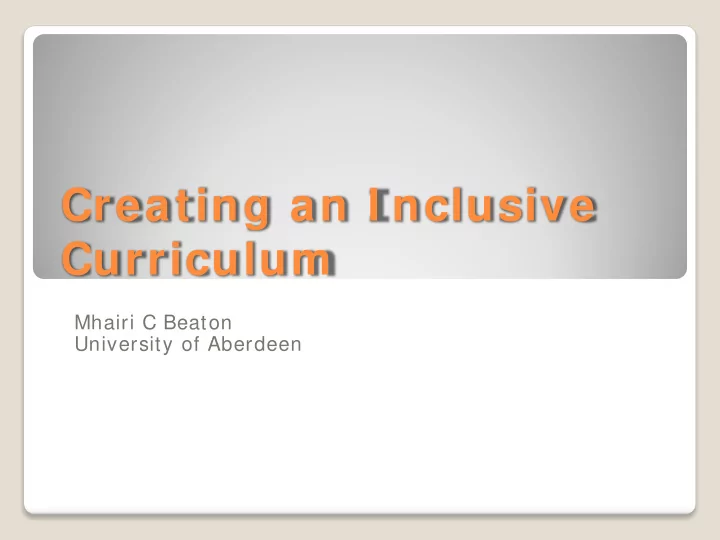

Creating an I nclusive Curriculum Mhairi C Beaton University of Aberdeen
Reciprocal Cycle Research Teaching, Professional Learning and Learning Assessment
Background to the Project Review of M.Ed in Inclusive Practice Programme including development of online option. Findings from Doctoral study. Conversation with programme participants (Ross, 2000).
Curriculum and I nclusion Dewey (1916) viewed the curriculum as ‘transformative’ and a process to promote equality in society. Apple (1990) concludes that schools are intentionally organised to unequally distribute knowledge and therefore contribute to inequality in society.
M.Ed in I nclusive Practice Program m e Outline ( online option) Participants must engage with three 30 credit modules form a choice of: o Inclusive Pedagogy o Participation and Learning/ Literacy Difficulties and Dyslexia o Curriculum Transformation and Change + Professional Enquiry (in preparation for work based project. --------------------------------------------------------- o 60 credit work-based project
Outline of CTC m odule Online format Four Collaborate Classroom sessions Ongoing reading and guided discussion on forums Assignment based on theory and practice An understanding, within the context of schools and institutions, of the influences and assumptions which shape curriculum policy and its implementation. The concept of change as it relates to the development of inclusive curricula. Possible sources of conflict and tension which may affect relationships particularly within the working contexts of participants. The role of curriculum leadership and professional and personal activities within interconnected systems.
IN PREPARATION Monday 27 th of January – ‘Managing Mice at the Crossroads’ - Initial Thoughts about Tuesday 4 th of February Curriculum Implementation ONLINE WORKSHOP The idea of curriculum implementation Tuesday 4 th of February 4-6pm Curriculum for Excellence Tutor: MB Assessment is for Learning Tuesday 4 th - Tuesday 11 th The Curriculum – reproduction or transformation? February Tuesday 11 th -Tuesday 18 th Curriculum for Excellence – transformational change or business as February usual? ONLINE WORKSHOP CTC for inclusion Tuesday 18 th of February 4-6pm Tutor MB Tuesday 18 th – Tuesday 25 th of Working with the Index for Inclusion February Tues 25 th February -Tuesday 4 th CTC in your area of March Tuesday 4 th of March Tuesday Self-study and preparation for online presentation 25 th of March ONLINE WORKSHOP Online Presentations and discussion Tuesday 25 th of March 4-6pm Tutor MB ONLINE WORKSHOP MB Online Presentations Thursday 27 th of March 4-6pm Discussion of assignment Tutor MB Summer Term Assignment Friday June 6th Hand in date
Curriculum Transform ation and Change Main concepts resonating w ith participants Curriculum not occurring naturally but is constructed by society for social/ political reasons. (Gillies, 2006) Ideas of curriculum design being based on values Curriculum-as-written (Gillies, 2006) Curriculum-as-enacted Curriculum-as-experienced (Sloan, 2009) Product curriculum Process curriculum (Kelly, 2009)
Cathy Secondary school context in rural setting Recently promoted Principal teacher in ASN provision ‘Skills for Life and Learning’ Process model starting with the 4 capacities and analytical evaluation through Sloan (2009). Originated through listening to pupils. Further consultation with SMT and other colleagues ‘Experienced curriculum’ – through personalisation and choice, aspiration to make the course relevant and worthwhile ‘participation is about being with and collaborating with others’ (Booth and Ainscow, 2011)
Richard Primary context Social and Emotional Behavioural Difficulties unit attached to mainstream building Discussion with parents/ carers on which values should lie at the of the mission statement for provision/ curriculum in unit to inform and shape actions within the school. CfE definition of the curriculum- ‘the totality of the experiences which are planned for the children and young people through their education, wherever they are being educated.’ Holistic view of child Tension for pupils on split placement as values underpinning curriculum not shared.
Claire Rural Secondary Context Guidance teacher with responsibility for S1-6 Local Authority decision to implement new policy on discrimination Need to move understanding about disability from the ‘hidden curriculum’ and school ethos to overt, planned curriculum. Values – troubled that one centrally imposed set of values was determining their curriculum. Consultation with all year groups on unit of work for PSE – questionnaire and follow up interviews Later development to embed across the curriculum Later development to relate work to HGIOS 5.1 Enrichment Options
Sum m ary Practitioners articulated a clearer understanding of the purposes of education as the main outcome of the module. Practitioners viewed themselves as ‘change agents’ They recognised the need for Senior Management approval but believed they had the agency, knowledge and language to effect this change. Curriculum for Excellence – tensions between the product/ process elements were seen as an opportunity rather than a problem.
Evaluation based on Opertti and Brady’s Fram ew ork ( 2 0 1 1 ) Teachers as co-developers of an inclusive curriculum Positive teacher attitudes around inclusion and diversity Teachers as competent professionals Teachers within inclusive schools, communities and societies I m plications Teacher Education Supporting Legislation and Policy Frameworks Trust
Recommend
More recommend